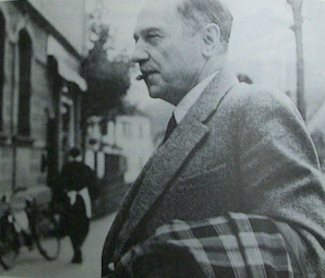
 It is my contention that the ever-contentious 20th century theologian, Rudolf Bultmann, was nothing less than a committed Lutheran. To those somewhat familiar with him, this statement will come as a bit of a surprise. Especially within the English-speaking world, Bultmann is famous for being the father of de-mythologizing and form criticism! But it was one of the chief accomplishments in his career that he placed the present preaching of the Word at the heart of theology. While this took many different (and controversial!) forms within his scholarly life, this also indicates that it is within his sermons that Bultmann’s theology is best represented. The following is the first of several posts offering some choice quotes from sermons he preached at Marburg, Germany between 1936 and 1950. Forget what you’ve heard – this is Bultmann at his best!
It is my contention that the ever-contentious 20th century theologian, Rudolf Bultmann, was nothing less than a committed Lutheran. To those somewhat familiar with him, this statement will come as a bit of a surprise. Especially within the English-speaking world, Bultmann is famous for being the father of de-mythologizing and form criticism! But it was one of the chief accomplishments in his career that he placed the present preaching of the Word at the heart of theology. While this took many different (and controversial!) forms within his scholarly life, this also indicates that it is within his sermons that Bultmann’s theology is best represented. The following is the first of several posts offering some choice quotes from sermons he preached at Marburg, Germany between 1936 and 1950. Forget what you’ve heard – this is Bultmann at his best!
In this sermon, he employs an antithesis between human and divine agencies which mirror’s Luther’s own antithesis between justification by works and justification by faith. Bultmann describes the life of faith and what he believes to be the way out of a life based upon control and planning. “Life” is not to be found on the basis on one’s initiative, but paradoxically in the release that comes through the forgiveness of sin. This freedom enables the believer to then perceive God at work in their life and the world.
Man’s characteristic estrangement from God consists in this: that he thinks he has the reins of his life in his own hands, that he thinks he can carve out his way in life through his own initiative and planning, and by his own integrity and achievement can securely lay the foundations of his worth…
When now man becomes deeply aware that his is not master of his fate, that his life is subject to great laws, that his works are small and the creations of his mind and art pass away, when thus his pride and boasting fade–then there comes to him a sense of his smallness, a sense of humility, but also at the same time a feeling of release and redemption. It spells release for man not only when he feels anxieties dissipated but also when the pressure of responsibility slackens. He feels emancipated when control is taken out of his hands and he knows himself to be sustained by a mightier hand, when he no longer needs to give his life its law, but knows himself to be subject to a greater law, which relieves him of ultimate care and responsibility, when he becomes aware that his life too is governed by divine ordinance…
But such faith is the Christian faith which as such is awakened by the message of the grace of God in Jesus Christ. Now this message is a message of forgiveness, a forgiveness which does not simply mean that God forgives us this or that moral failing, as among ourselves we can and should forgive each other our lapses. It declares rather that God forgives and has forgiven the fundamental sin which is that we have separated ourselves from God and have as it were cut ourselves from Him in order to live independently in our own strength. In Christ, He has created a new humanity; the humanity of those who allow the Good Shepherd to lead them back to God, the Omnipotent and Omnipresent, from whom, to whom, and through whom, are all things. This is what it means to believe in forgiveness: in the midst of care and responsibility to be free from care and the burden of responsibility, in the presence of fate to be free from the power of fate, and so free from the stresses of fear. When we have this faith, then God is present for us not only in nature but in the world and life as a whole, in history as a whole with its heights and depths, in the humdrum world of everyday as well as in the relaxation of festival days.

COMMENTS
4 responses to “Freedom and Control According to Rudolf Bultmann”
Leave a Reply














Goodness … that image of the William Wallace statue is amazing!
Todd – thanks so much for posting this. It is very helpful to me at this precise moment:)
That’s a fantastic quote from Bultmann, and a powerfully ironic photo of Wallace. Sure, one might not agree with all the man wrote, but who could not help but love any theologian who could smoke a cigar down to the toxic end like that! I agree that at the heart level, where these sermons are grounded, he was a good Lutheran, and a good Christian too.
I find Bultmann inspiring. In his exchange with Karl Jaspers it is evident that Bultmann is a committed Christian as well as a deep philosopher and penetrating exegete.
Thank you for posting this wonderful sermon excerrpt!